Croatian Telecom Donates 3 Million Kuna for Post-Earthquake Reconstruction
January the 1st, 2021 - The tragic Petrinja earthquake which affected Petrinja, Glina, Sisak and other surrounding areas in central Croatia has seen floods of help, aid and donations come in from across the country and indeed the world, and Croatian Telecom/Hrvatski Telekom is yet another entity to step forward and offer aid to those who have suffered as a result of the devastating natural disaster.
As Poslovni Dnevnik wrires, following the earthquake, Croatian Telecom's employees went out to the most heavily quake-affected areas to make sure the telecommunications network was fully functioning in order to keep everyone connected during those most difficult and stressful of moments.
In addition to the above, Croatian Telecom is donating a generous three million kuna for post-earthquake reconstruction in the afflicted central Croatian locations to the special Earthquake Reconstruction Assistance account.
"In the shortest possible time, we enabled the uninterrupted operation of base stations in the area of Sisak, Petrinja and Glina along with our partners, and we increased our capacities with additional mobile base stations. At the same time, we delivered 1,000 SIM cards and portable chargers to all of the earthquake-affected areas, and we're working on establishing a WiFi connection for the reception centre for people who have been left homeless,'' they stated from Croatian Telecom.
For more on the Petrinja earthquake, as well as helpful links for how you can donate funds, food, material, sanitary and other humanitarian aid, follow our dedicated section.
VIDEO: Watch How Petrinja Earthquake Felt in Middle of Lake
January the 1st, 2020 - The horrendous Petrinja earthquake which affected numerous central Croatian locations including Petrinja, Sisak, Glina and other smaller surrounding settlements took homes and even lives in the blink of an eye at the end of an absolutely terrible year.
Like the earthquake which occurred back in March 2020 in Zagreb, the natural disaster has caused tremendous amounts of material damage in an area of Croatia which has long since been neglected in many ways. The sound of an earthquake isn't something anyone who has experienced it is ever likely to forget. I can still hear the deafening sound of the Zagreb earthquake which hit the capital in the spring of last year, but what is the sensation of the plates moving when out in the middle of a body of water like?
The Petrinja earthquake will remain etched in the collective Croatian memory for a lifetime, with the reconstruction of Petrinja, if anything like Croatia's snail pace standards for other things, likely to last just as long. Nature heals far quicker than man made structures could ever wish to, and one man who was out in the middle of a lake at the time of the Petrinja earthquake's strike filmed his bizarre experience, one he isn't likely to have again.
Watch the video below:
For more on the Petrinja earthquake, with helpful links on how you can donate funds, food, materials, sanitary products and humanitarian aid, follow our dedicated section.
Croatian Makers 2020 Review: Digital Skills for the Next Generation
January 1, 2021 – The year 2020 was the most difficult for many, especially for children. With Croatian Makers, the largest extracurricular STEM program in Europe, the Institute for Youth Development and Innovation made a special effort to make up for at least part of what children lost.
The Institute for Youth Development and Innovation (IRIM) is the largest non-state educational program in the EU that helps children realize their potential and be equal citizens of the 21st century.
Launched in Croatia, IRIM primarily operates there but has also expanded its activities to Serbia, BiH, and Kosovo. It focuses on the development of digital and scientific literacy and technological and other competencies within the STEM area for young people.
This year, the challenge was all the greater because they had to pay special attention to the heavy workload and stress to which were exposed the project participants – children and youth. TCN brings their 2020 review by topic below.
Croatian Makers Robotics League
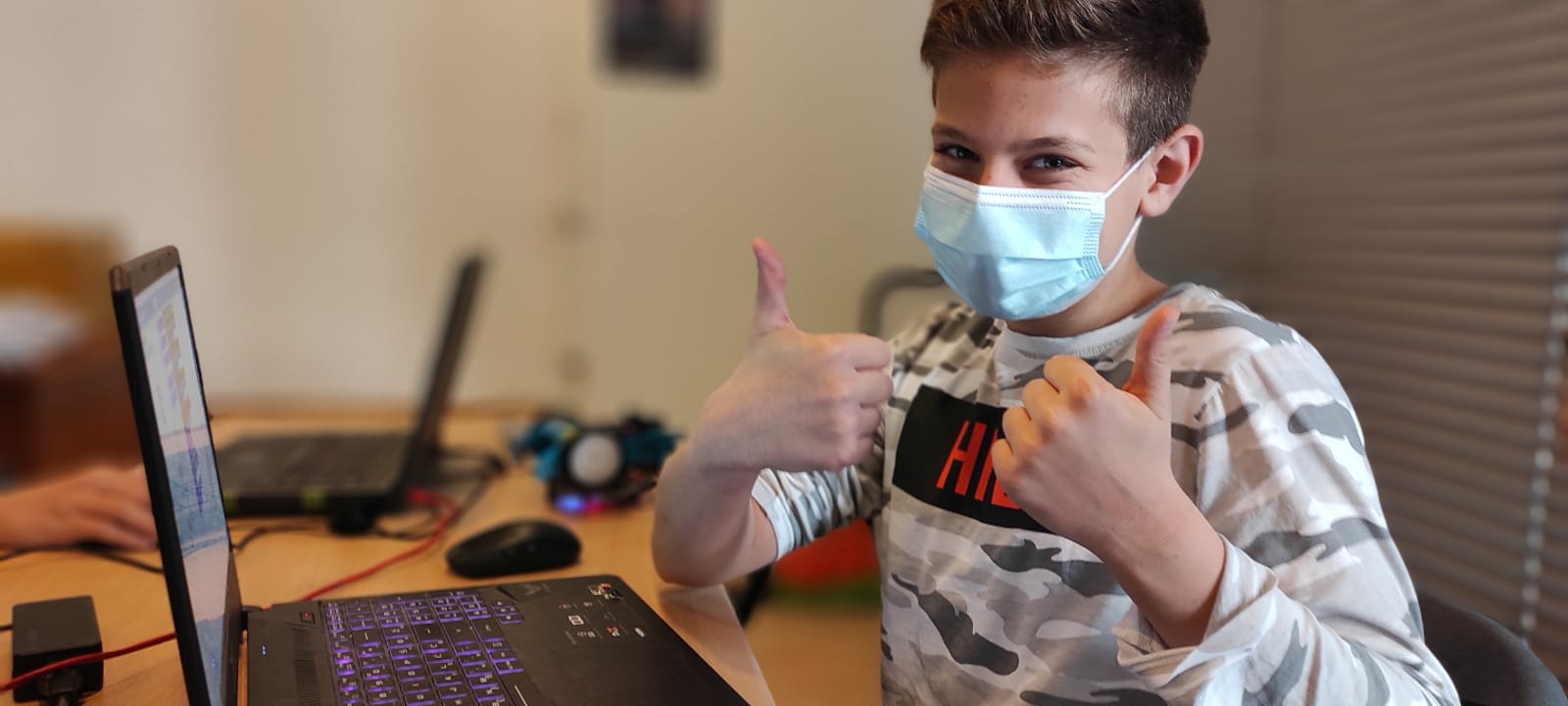
Source: IRIM/Croatian Makers
Robotic League is the first major IRIM project which began in the 2015/16 school year. The goal is to broadly involve robotics, automation, and programming in primary school education.
They have included more than 600 schools and non-profit organizations and donated 3,000 mBot robots (5 per institution). In each of them, they educated at least one mentor free of charge so that he could work with children.
Despite the pandemic and the introduction of online classes, IRIM managed to hold as many as three of the planned four rounds. The League's principle is regularity and locality, not a one-time competition for the best. In this way, they achieve equal opportunity and better integration into children's education.
They plan to hold three rounds of the League this school year. All Croatian Makers League's institutions can participate despite the pandemic. They have adjusted the competition, and all activities are online. This school year, the competition's theme is the exploration of the planets and the robot's return to Earth, as a continuation of the past year in which the robot embarked on a space journey.
Digital Citizen 2.0
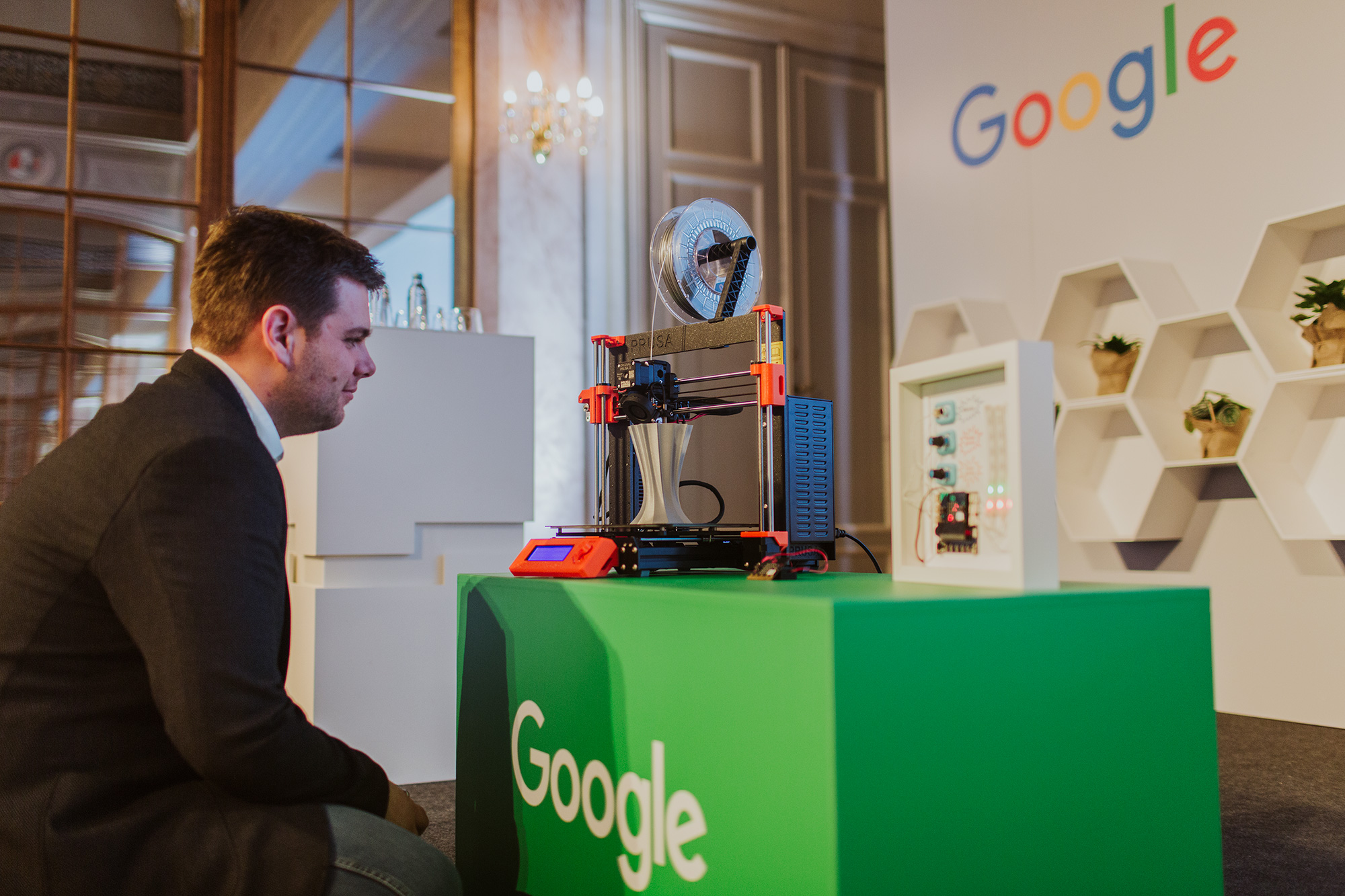
Source: IRIM/Croatian Makers
In February, they continued the Digital Citizen 2.0 project, a collaboration with Google.org that supported it with an additional 400,000 dollars. The project's goal is to develop digital skills in libraries, transforming public libraries into digital innovation and education centers.
They do this with technologies such as microcomputers, robots, and 3D printers. They make modern educational technology accessible to adults and children, which will enable the introduction of digital skills in local communities.
The project is international, funded by Google.org, and takes place in 170 libraries in Croatia, Bosnia and Herzegovina, Serbia, and Kosovo.
In August and September, they held 100 workshops (one in each library in the project in Croatia) where they donated micro:Maqueen robots to libraries and educated librarians on this equipment.
New educational web portal
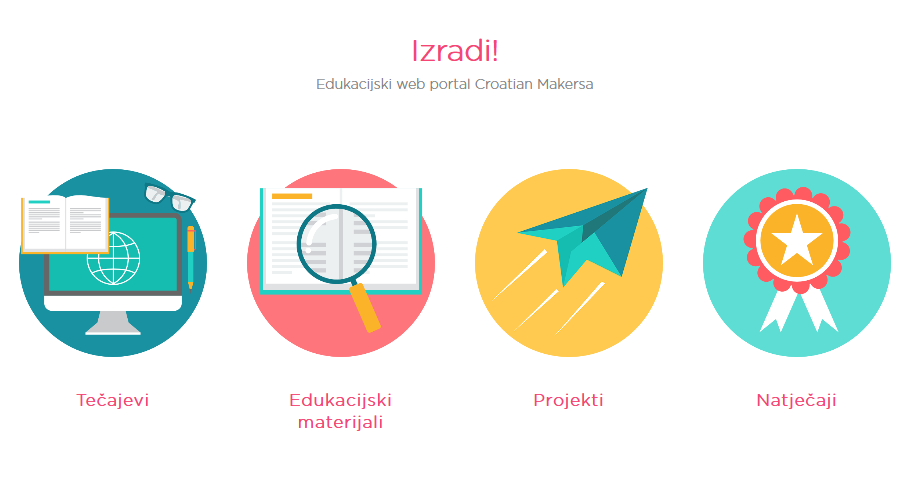
Source: IRIM/Croatian Makers
During the summer, they released a new and improved "Izradi!" educational web portal. As before, users can educate for free about using the technologies they use, but with greater interactivity.
Users also have access to a system of courses that guide them by learning about technologies and making it fun. In the end, they receive certificates with learning outcomes and acquired knowledge. The portal is adapted for children and adults, and by participating in the courses, users can also win "maker "badges.
Prize competition
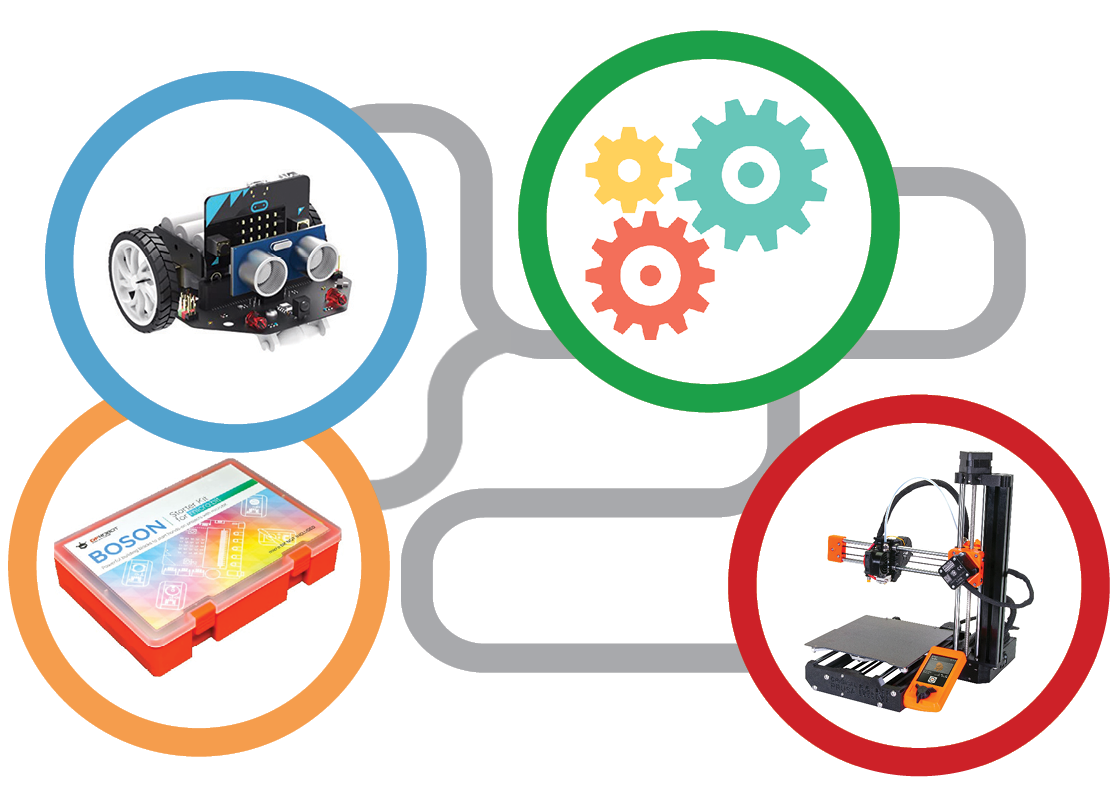
Source: IRIM/Croatian Makers
At the beginning of December, they opened two "Borrow, make, conquer "creative competitions. All interested can participate, regardless of age, education, and prior knowledge of programming, device making, and 'tinkering.'
The competition lasts until February 1, 2021, and the applications are still open. The main prize is a Prusa Mini 3D printer.
Digital Libraries for Local Development
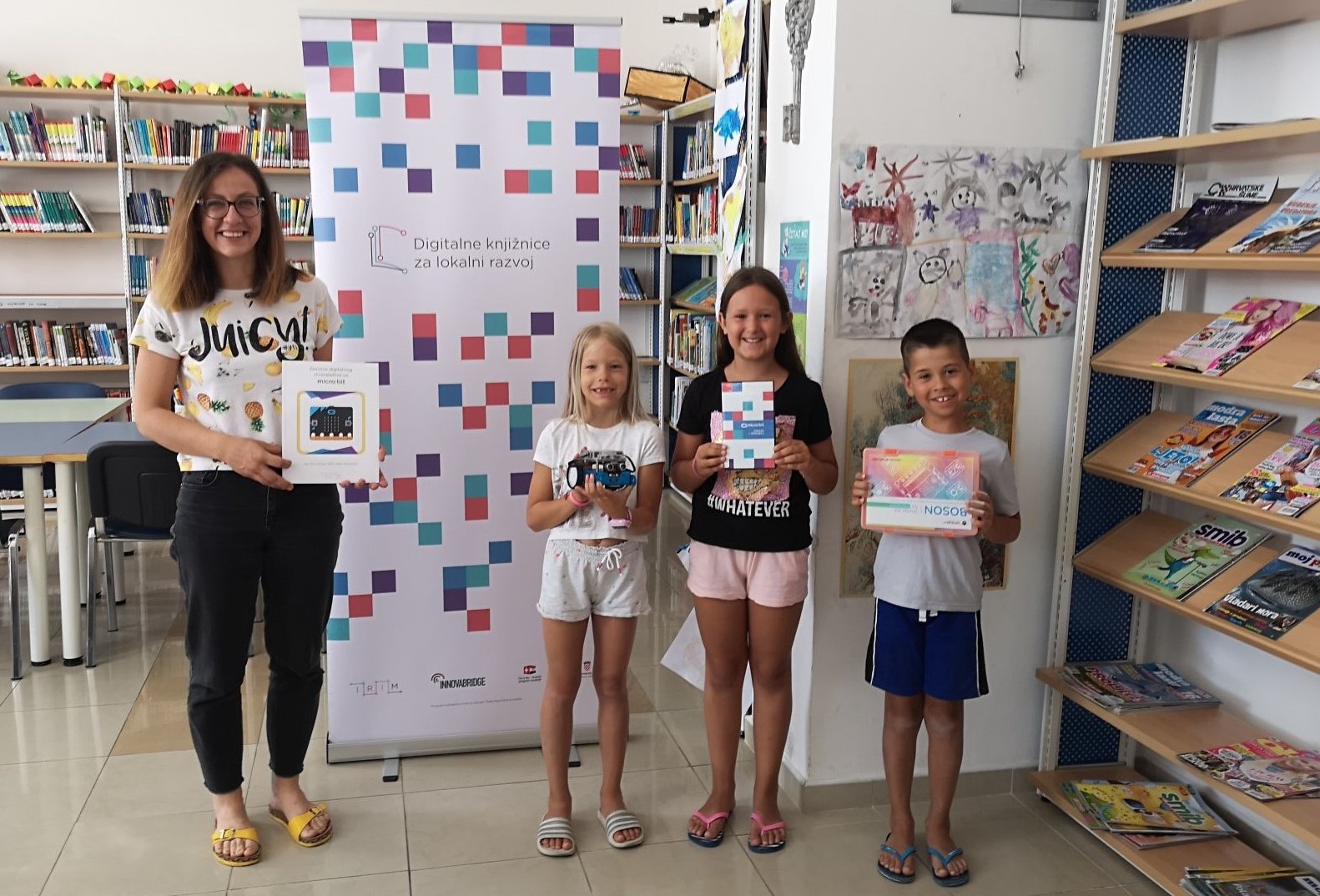
Source: IRIM/Croatian Makers
This project aims to strengthen libraries in Croatia and Switzerland. The goal is for them to become centers for the acquisition of STEM knowledge and digital competencies. The project uses a 'crowdsourced' network of devices for measuring atmospheric variables, which is free and publicly available in libraries.
They held two educational cycles of workshops around Croatia in which IRIM educators visited each library on two occasions. The first time by donating handbooks with a short introductory education, and the second time with the donation of AQ:bits and education.
AQ: bit is a device designed by IRIM educators that can be used to measure atmospheric variables (concentration of micro-particles in the air, humidity, pressure, temperature) and are intended as an educational supplement for micro:bit.
Within the project, they held 200 workshops and issued two handbooks as well.
Source: IRIM/Croatian Makers
Generation NOW
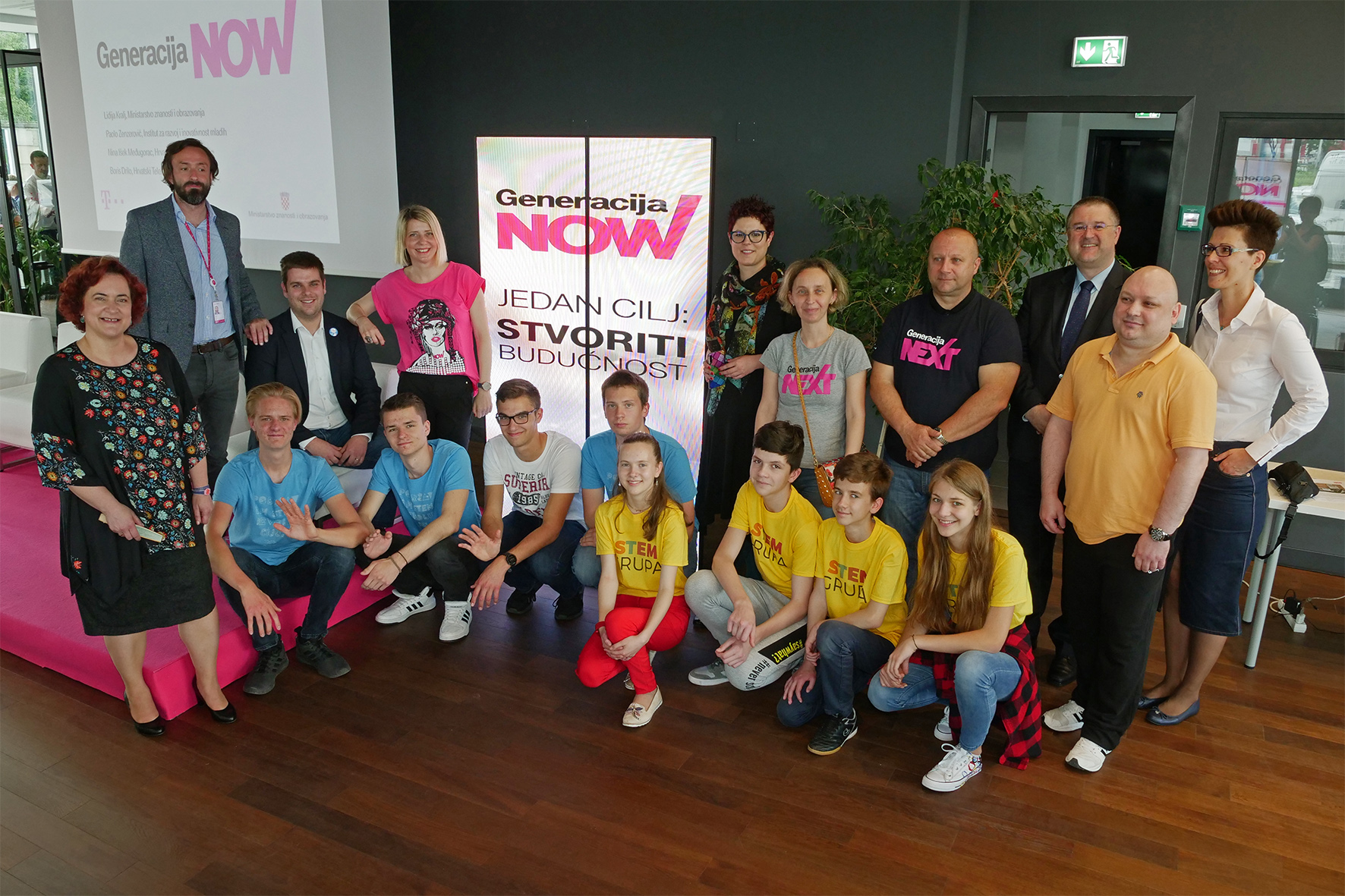
Source: IRIM/Croatian Makers
For several years now, IRIM has been implementing projects in partnership with Hrvatski Telekom. The aim is to introduce Internet of Things technologies in schools and associations throughout Croatia.
The goal is to connect existing and new knowledge in the use of Internet of Things technology, develop creativity, innovation, and create an opportunity for children to implement IoT projects from concept to finished model.
In the school year 2019/20., they included 110 institutions in the project and 2020/21—75 of them. Due to the coronavirus pandemic, the project will be extended for another year to allow all participants to create imaginary projects, present them in the final competition, and win valuable prizes.
Coronavirus pandemic and IRIM
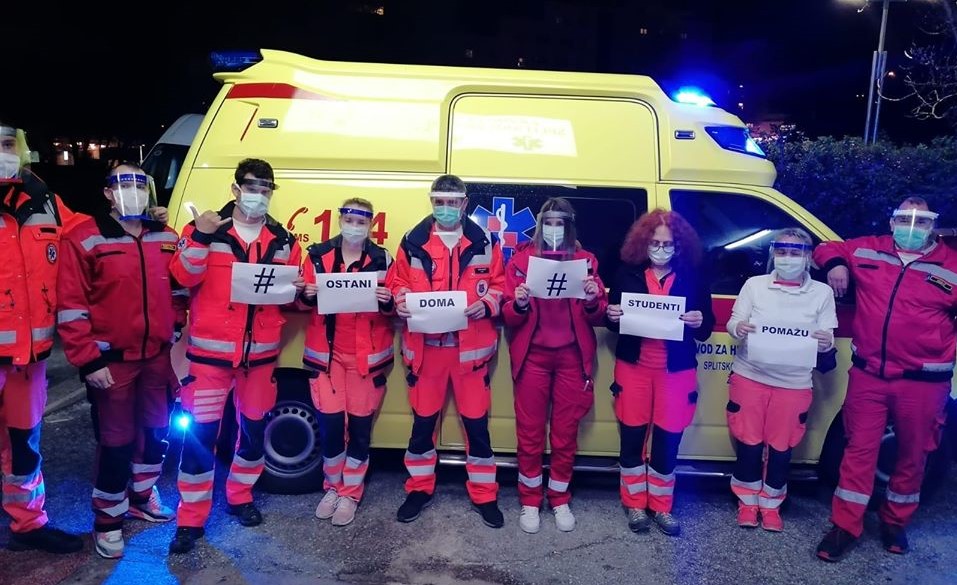
Source: IRIM/Croatian Makers
When they found themselves in a situation where everyday work and activities were no longer possible, they decided to join the Croatian Student Union's initiative to produce protective visors.
In just a few days, with partners and associates, they managed to organize and ensure protective visors' production. In the end, they donated 6,500 protective visors, which covered the initial needs of hospitals.
To read more news from Croatia, follow TCN's dedicated page.
Croatian Army installing Container Homes in Glina Area
ZAGREB, Dec 31, 2020 - The Croatian Army early on Thursday afternoon started installing containers for the temporary accommodation of civilians in villages in the Glina area, hit by a 6.2 magnitude earthquake on Tuesday, the Defence Ministry said.
The containers come from Croatia's commodity reserves and some have been donated by Austria, the ministry said, noting that the installation of containers would continue in the coming days.
Ministry Says Assistance Provided for Domestic Animals in Quake-Hit Area
ZAGREB, Dec 31, 2020 - The Agriculture Ministry has been coordinating activities with the relevant services in the areas hit by Tuesday's 6.2 magnitude quake in Sisak-Moslavina County to secure help in providing shelter for domestic animals and buying and distributing animal feed.
The ministry noted that family houses and barns in the areas of Glina and Petrinja had suffered extensive damage and that the collection of information on the damage was continuing.
Thirteen carcasses were removed on Wednesday, the ministry said, noting that if necessary, transport and accommodation would be secured to cater to 1,400 heads of cattle on farms in the area of Krizevci.
The ministry noted that sufficient quantities of animal fodder would be secured and distributed in the quake-hit area.
Local farmers will be able to renew their herds and production capacity with the help of measures from the Rural Development Programme, the ministry said, noting that application for EU funding would be expedited.
It also said that pets in the quake-struck area were being provided for in cooperation with animal shelters, associations and temporary carers.
Deputy PM Milosevic for Ensuring Accommodation for Citizens and Speedy Reconstruction
ZAGREB, Dec 31, 2020 - Deputy Prime Minister Boris Milosevic from the ranks of the Independent Democratic Serb Party on Thursday said that the first thing to be done is to secure containers and tents for temporary accommodation, for reconstruction to commence immediately and that those affected by the earthquake are relieved of paying contributions.
"The first task is to ensure containers, tents and temporary accommodation and then to quickly start with reconstruction," said Milosevic, who arrived in Petrinja and visited the town and houses affected by Tuesday's earthquake.
He said that account would be taken so that citizens affected by the earthquake are relieved of any contributions. "Everything will be taken into account. Everyone wants to be fully engaged to help citizens and make it easier for them. We will try and help citizens as much as possible and relieve them of any obligations to ensure that they have a dignified home," said Milosevic.
The thing that the government will advocate is to embark on reconstruction with as little red tape as possible, he added.
He said that the state was doing all it can, all services have been deployed as well as the entire administration. The social welfare ministry will send mobile teams to villages that Milosevic visited on Wednesday.
Milosevic said that he had spoken with the president of the Serb National Council, Milorad Pupovac, who informed him that SNV had ensured ten containers via Bosnia and Herzegovina's Republika Srpska entity and its President Zeljka Cvijanovic that would arrive in Croatia today as well as a lorry full of building material.
State and citizens reacted immediately
"The situation is difficult. There are a lot of problems. Villages are dispersed. However, aid is organised and is arriving to all those villages. Maximum effort is being invested to provide the minimum help at least and then everything else," he underscored.
Responding to a comment by a reporter that it seems everything is occurring due to the enthusiasm of citizens and that the state should have a systematic solution, Milosevic claimed that the state reacted immediately and so did citizens.
"The Prime Minister and President immediately went to Petrinja. A cabinet meeting was convened and interventionary funds were allocated. We will monitor the situation. The state did everything it could do," he underlined.
Asked whether he was bothered with Pupovac's statement that a girl who was killed in the earthquake was from a mixed marriage, Milosevic said that neither he nor anyone he knows separated victims based on ethnicity.
"As far as I know, he (Pupovac) was replying to a question by a reporter from Tanjug, who asked whether any of the casualties were of Serb ethnicity. Had an earthquake occurred in Vojvodina, reporters there would certainly have asked if there were any ethnic Croat casualties. That was exclusively in that context. There was no intention to divide the victims," said Milosevic.
PM is Looking at 2021 with Hope, Optimism
ZAGREB, Dec 31, 2020 - Prime Minister Andrej Plenkovic said on Thursday he was looking at 2021 with hope and optimism, saying the discovery of the COVID-19 vaccine should make it unlike 2020 and that he expected Croatia's economy to grow 5% in 2021.
Speaking to the press, Plenkovic said there was "a global consensus and everyone is crying out for a year like 2020 never to happen again." He cited German Chancellor Angela Merkel, who said 2020 was the most difficult year in her 15 years in office.
"Then we, who also had an earthquake, can say that it wasn't the simplest for us either," Plenkovic said. "I think we have shown toughness, resilience, a desire to overcome all crises and help every Croatian citizen and do all we can for the whole system to function while dealing with what's happened to us."
Plenkovic highlighted dealing with the health crisis, ensuring financial stability, jobs and the functioning of the economy, and keeping a relatively normal way of life. "I think we have succeeded in that."
The prime minister said he was looking at 2021 with hope and optimism. "I think we need that."
The vaccine has turned a new leaf in the fight against COVID-19 because we will no longer deal with the disease by utilising so-called anti-epidemic measures and variants of the 14th century quarantine, he said.
"Now that we have a vaccine, the situation seems different," he said, adding that the most important thing was to make it through the winter months when the virus was at its deadliest.
By spring, he said, if we are disciplined and keep the declining infection trend, the arrival of larger quantities of the vaccine will decrease the pace of the disease. "And then we'll have a situation in which 2021 certainly shouldn't be like 2020."
Plenkovic said he expected the economy to grow 5% next year, the start of all activities related to the National Recovery and Resilience Programme, the absorption of EU funds, reforms and new projects.
He said the money ensured (over €24 billion, €6 billion in grants from the Next Generation EU instrument) would be "invested in expenses, programmes, projects and development, the green transition, the digital transition" to "kickstart reforms and invest in the economy."
He said a large portion of money from the National Recovery and Resilience Programme would go to the private sector.
There are four complementary documents - the government programme, the National Reform Programme, the National Development Strategy and the National Recovery Programme, Plenkovic said, adding that funds had been ensured for the next decade "in an extraordinary measure."
Over the next three years Croatia is also absorbing funds from the 2014-20 EU budget, he said.
A journalist remarked that all this was ambitious. "What else should we be but ambitious? We didn't run in the election to do nothing," countered the prime minister.
He noted that after the May 2021 local elections, Croatia would not have another vote for three years. "So, we have stability, a strong parliamentary majority which is functioning excellently, and we expect everything to be done that is key after such a crisis. This is a chance for a new approach, a new outlook and a different Croatia in the fourth decade of its democracy. A better one."
Croatia Appoints Steering Committee on Euro Adoption
ZAGREB, Dec 31, 2020 - Croatia's national council for the adoption of the euro as legal tender held it eighth meeting on Thursday, appointing a steering committee for the implementation of the national plan to replace the kuna with the euro.
The prime minister's adviser Zvonimir Savic was appointed chief coordinator of the steering committee, which will also include Stipe Zupan, State Secretary at the Ministry of Finance, and Michael Fauland of the Croatian National Bank (HNB).
Six coordinating committees were also appointed, namely the Committee on cash exchange, the committee on legislative adjustment, the committee on the adjustment of general government, the committee on the adjustment of the financial system, the committee on the adjustment of the economy and consumer protection, and the communications committee.
Speaking to the press after the meeting, Prime Minister Andrej Plenkovic recalled that the national plan to replace the kuna with the euro, prepared by the government and the central bank, was adopted by the government last week. The document gives an overview of all important activities to be implemented in the time ahead by private and public sector stakeholders as part of preparations for the adoption of the euro as legal tender.
The plan is a follow-up to the euro adoption strategy adopted in 2018.
Citing consumer protection among the basic principles of the plan, Plenkovic said that the euro would be adopted at a fixed kuna-euro exchange rate without any cost to consumers, adding that a mechanism would be set up to prevent any miscalculation of prices or unjustified price hikes.
The prime minister went on to say that a proposal would be made at the next session of Parliament to discuss all aspects of the euro adoption strategy and the national plan to sensitise both the lawmakers and the public to this strategic goal of Croatia for deeper integration with the European Union.
He said that this entire process had been very well structured over the past two and a half years, recalling Croatia's entry into the European exchange rate mechanism II, a waiting room for eurozone membership. He said that Croatia was meeting its commitments to money laundering prevention, a better business environment, better public sector management and judicial reform.
Plenkovic said that 1 January 2023 remained the government's target date for eurozone entry.
HNB Governor Boris Vujcic said that the coordinating committees were expected to appoint their members by the end of January and start developing action plans for their respective areas. The action plans would be adopted at a meeting of the national council in the first half of 2021 and would be implemented until the introduction of the euro, he added.
Greece Sends Humanitarian Aid to Croatia
ZAGREB, Dec 31, 2020 - A Greek Air Force plane arrived in Zagreb late on Wednesday carrying humanitarian aid for the earthquake-affected areas in central Croatia, the Croatian Ministry of Defence said on Thursday.
The shipment included 40 tents, 50 electric heaters, 500 folding beds and 500 sleeping bags.
The plane was welcomed by Zdravko Jakop, Secretary of State at the Ministry of Defence; Antonia Katzourou, Greek Ambassador; Terezija Gras, State Secretary at the Ministry of the Interior; and Brigadier General Michael Krizanec, Commander of the Croatian Air Force.
Jakop thanked the Greek ambassador for her country's generous assistance "in these unpredictable and challenging times".
Katzourou said that the relief shipment was just a small token of solidarity with the people struck by the disaster. She expressed hope that it would help and provide at least some comfort to people in the affected areas.
Greece's aid shipment came as part of a response from EU member states after Croatia activated the EU Civil Protection Mechanism on December 29 requesting emergency aid in the form of equipment such as winter tents, torches, electric heaters, folding beds, sleeping bags and residential containers.
Thirteen EU countries and Turkey responded to Croatia's call. Aid was offered by Austria, Bulgaria, the Czech Republic, France, Greece, Hungary, Italy, Lithuania, Portugal, Romania, Slovakia, Slovenia and Sweden.
Beroš: Record Blood Donations Yesterday, Over 1000 Vaccine Doses for Petrinja
December 31, 2020 – Health Minister Vili Beroš commented on the record blood donations collected in Petrova Hospital in Zagreb yesterday and coronavirus vaccine doses sent to the quake-affected area.
As N1 reports, in front of the Dubrava Hospital, where some COVID positive patients arrived from the earthquake-affected area, Health Minister Vili Beroš commented on patients' situation after the earthquake.
Record blood doses after 1995
"This morning, I received information from the Croatian Institute for Transfusion Medicine that yesterday, a record number of blood doses was collected in Zagreb's Petrova Hospital, over 750 doses. The last time we had a similar turnout was August 5, 1995, the beginning of the Storm war operation. This shows the consciousness of the Croatian people," said Beroš.
"From a health point of view, this is a challenge. We want to provide health care to everyone. Given that most health facilities have been severely damaged, I believe we will respond adequately. As much as 90 percent of the Sisak hospital is out of order, so we have to adjust the health system and provide health care to the entire surrounding area," said Beroš.
He pointed out that many health centers are out of order. He also revealed that the Health Ministry sends about a thousand doses of vaccine to the affected area.
'Virus is still here'
"On Saturday, a team of epidemiologists from the Croatian Institute for Public Health will vaccinate all people who are in collective accommodation, emergency workers, and emergency services who are in the area and who will be there for three weeks, including all members of civil protection. Plans exist to adapt to the situation. Epidemiologists will estimate the situation and see how many vaccines are still needed. We are sending more than 1000 doses," said Beroš.
The Minister pointed out that there are enough reserves of protective equipment. He also said that the problem of drug delivery would be solved. Rapid antigen tests are being conducted among nursing home users in the area to find out if there are infections in collective accommodation.
"After the earthquake, Minister Aladrović contacted me. They enabled the accommodation for nursing home users from Petrinja in the Popovača Hospital and other places. There are positive cases among the users, so we are looking for accommodation for them with the county authorities. We still have to stick to measures, masks, distances, disinfection. The virus is still there. These circumstances favor its spread," said Beroš.
The Minister stressed that all health professionals with COVID patients must receive the promised money for the reward.
For more on the Petrinja earthquake, please follow our dedicated section.


